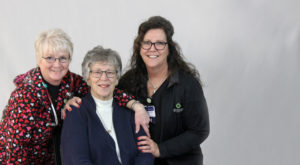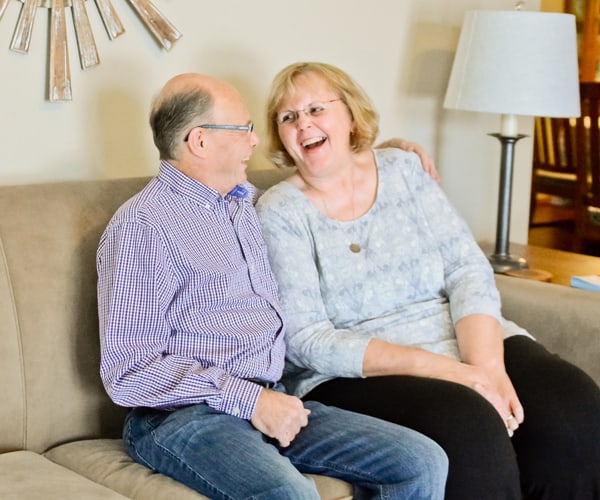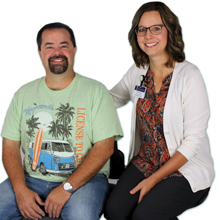Patient Stories
Her Heart was in the Right Place
Seated in an exam room of the Emergency Department, Cheryl Wessels remembers saying to her nurse, “I don’t belong here.”
And that’s the last thing Cheryl remembers before she died.
In the Emergency Department
It was the 28th of September, and it had been a normal Friday morning for Cheryl, who is retired but remains very busy as a volunteer. She’s the treasurer of the Cass Health Auxiliary, volunteers in the Gift Shop, serves as treasurer for her church, and is also the lead volunteer behind the little dresses for Africa project, which has sewn and donated more than 10,000 dresses so far. She also helps out with the bookkeeping at the Wessels’ former business, the Anita Vet Clinic.
Cheryl was at home in Anita getting ready to come to Atlantic for a meeting, and it was about noon.
“I broke out in a sweat,” said Cheryl. She hadn’t been exercising, she wasn’t fevered – but she was perspiring a lot. “I thought maybe I was coming down with the flu, so I called the Anita Medical Center.”
Brenda Euken was working at the clinic that day, and she clearly remembers the phone call.
“When Cheryl called and told me about her symptoms, we advised her to go to the Emergency Department right away. I asked if she was home alone, and she was, so I offered to call the ambulance for her. Cheryl wanted to call her husband instead. I stressed to her that she could not drive herself to the hospital – and that her symptoms were absolutely nothing to ignore,” said Brenda. (In fact, Brenda was so concerned about Cheryl, she followed up with the ED shortly afterwards to make sure Cheryl was there.)
When Jerry arrived home, Cheryl had started to feel a bit better, but Jerry insisted they go.
“I felt ridiculous. I didn’t have any pain. I was just clammy. That’s it. Jerry said ‘do you want me to take you, or do you want an ambulance?’”
She did think it was possible that she could be having a stroke, so she took an aspirin just in case.
Jerry drove Cheryl to Atlantic and checked in at the ED. They were seated in an exam room, where they were soon greeted and cared for by Judi Nelson, RN.
“She sat there and kept saying, ‘I feel silly being here.’ And I told her that I’d rather have her come to the ED ten times and not need me, then not come in the ONE time you really do,” said Judi.
Judi gave Cheryl some additional aspirin, placed a heart monitor on her, and then left the room. Seconds later, Judi looked at the central monitor at the nurses’ station – just in time to see Cheryl’s heart do something unexpected.
“It was a funky rhythm. I thought she either had a loose lead, or she is in v-tach. I quickly headed back to Cheryl’s room, just as her husband came out of the room to tell us that she had passed out,” said Judi.
Cheryl’s heart had stopped; she was not breathing.
That’s when the ED team sprang into action. They called a code, and immediately started CPR compressions. Judi recalls Cheryl’s heart starting again. “She woke up and spoke to us, and then she went out again,” said Judi.
Cheryl’s heart stopped a second time – and again the staff began compressions and then shocked her heart with a defibrillator. Dr. M.A. Johnson was working in the ED that day.
“The nurses told me that she was in an unusual rhythm and not awake. We started CPR, we got IVs in her, and called in the helicopter,” said Dr. Johnson.
“According to Jerry, there were 14 people there instantly. It was miraculous -- the orchestration was amazing,” said Cheryl.
Cheryl’s heart was beating again – and she was quickly flown to Bergan Mercy in Omaha where the cath lab staff was on alert and waiting for her.
“There was a nurse taking care of Jerry, who was a basket case at this point. The nurse called Nate Hansen to come and drive Jerry to Omaha. By the time they got there, I had been to the cath lab, and I was already in my room on the cardiac floor.”
While in the cath lab, Cheryl’s cardiologist performed an angioplasty to open the blocked artery, and then had two stents placed in her heart – one upper and one lower stent.
The culprit behind Cheryl’s troubles? A “widow maker” heart attack – a nickname term for the type of heart attack caused by a blockage in the left anterior descending artery. Cheryl was incredibly lucky that she went into cardiac arrest in the ED – where all of the right people and tools were at hand.
Recovery & Cardiac Rehab
Cheryl doesn’t remember any of this – her first memories are maybe from Saturday or Sunday.
“I woke up with no pain, and I do remember asking where I was,” said Cheryl.
Cheryl remembers a staff member at Bergan touching her on the shoulder and saying, “We usually don’t see women.” Too often, women think that their symptoms couldn’t be a heart attack, or they hesitate to get checked out. That moment hit home with Cheryl – she was starting to see the bigger picture of just how lucky she is. “I lost my dad young in his 50s to a heart attack. My mother had a heart attack in her 70s. But I thought it wasn’t going to happen to me,” said Cheryl.
Jenny, one of the Wessels’ three daughers, said, “Everyone at Bergan basically said ‘Atlantic saved your mom’s life.’ The doctors, the dietitian, the nurses, everyone. Over and over we heard that. ‘You have Atlantic, Iowa to thank for being here.’”
Jenny also talked about how comforting it was to hear the Bergan Mercy staff talk about the hospital in Atlantic. “We [the daughters] live in three different states. It was so reassuring to hear their staff say great things about this facility in Atlantic. There was a comfort level between the cardiologist and Cass Health – it was clear there was a great relationship between Bergan and Cass Health. Never once did we feel like her follow-up care couldn’t be delivered well here.”
After she was discharged and returned home, Cheryl began Phase 2 Cardiac Rehab, which included 36 sessions of closely monitored exercise and education. Cheryl worked with the team in Cardiac Rehab at Cass Health to rebuild her cardiovascular fitness and her confidence.
“I didn’t see it [the heart attack] coming. All this happened, and I didn’t know. It’s a loss of independence. It is still hard to comprehend what happened. If I broke my arm, I could feel that it hurt and that it is better. I had no pain. It’s overwhelming to try and understand,” she said. “After my heart attack, the fatigue is what surprised me. It’s a different tired. I would get tired easily, and I just shut down.”
The Cardiac Rehab nurses worked with Cheryl to feel more confident about her health and abilities, and she’s learned a lot about the importance of exercise being a part of her daily life from now on. “One of the ladies came in and said ‘you’ve probably been losing ground for 10 years, and just thought ’I’m getting older, it’s getting harder.’ With the cardiac rehab care, you’ll probably feel better than you have in years.”
Jenny chimed in, “I think she’s learned that there is a difference between being busy and exercise.”
Today
Cheryl has graduated from Phase 2, and now participates in the Phase 3 program. Phase 3 rehab allows patients the ability to continue to come to Cass Health to exercise in a safe, monitored environment. “The care and the people are amazing. I haven’t seen anyone who wasn’t super kind and patient. It’s quite an experience. They are compassionate, but they’re tough. They know what’s best, and they know the plan,” said Cheryl.
Cheryl has pieced together the story of her heart attack – from the call to the Anita clinic, to her care in the ED, to her time in Cardiac Rehab – and realizes that it all played out like it was supposed to, and she was in exactly the right place.
“Everything they did here was perfect,” said Cheryl. “The whole thing was out of my hands, and I know I have someone watching over me. I can’t express enough how great my care was. Everything went like clockwork, and the dominos just fell in place. I am so blessed.”


